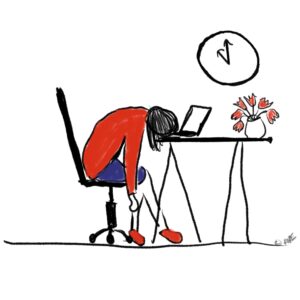
Burn-out: exhaustion of physical or emotional strength or motivation usually as a result of prolonged stress or frustration–Merriam-Webster dictionary
Many are sharing with me that they are experiencing burnout these days. Healthcare workers seem particularly impacted after the long road of Covid-19 and worker shortages. Yet, clients across industries are reporting a loss of energy and enthusiasm and being overly tired, feeling depleted and exhausted. Many feel cynical and even angry about their work, family life, and the future of the world. Some feel indifferent like they are slogging through life and that they are not efficient or effective. Researchers say that burnout occurs when demands are greater than our resources, and we experience allostatic stress. More energy is being expended than energy being cultivated.
Sound familiar? Emotions are contagious, and burnout seems to be too. What can you do? We need to take action at an individual and collective level.
Of course, to address exhaustion, we need to focus on our physical health and ensure that we get enough sleep, eat a healthy diet, and exercise. We need to take time for rejuvenation and rest. That means taking time away from work and engaging in positive activities that are enjoyable and energy-enhancing. Perhaps you dance, do artwork or yoga or another hobby.
To address cynicism and lack of efficacy, we need to connect with what is most meaningful to us and recall our purpose and values. How can we take action to ensure a greater sense of meaning? Perhaps you help someone who is in need of work on a project that is important to you, such as addressing climate change or inequities. It helps to build meaningful relationships and take opportunities to learn and explore areas of curiosity. It is useful to acknowledge and accept our experience and give ourselves empathy. Then, we are positioned to take action.
The research on burnout has consistently shown that it is a function of both work environment characteristics and individual behaviors. It is essential that organizations reflect on the systemic factors contributing to burnout and work to create environments that support engagement and productivity. With recent changes where organizations are experiencing high turnover and a shortage of workers, more attention is needed to focus on creating conditions that enable resilience and well-being.
At an organizational level, we need to recognize the stress placed on people when they are continually asked to do more and be immediately responsive to clients and each other. It is important to review systems and processes to assess how to make life better and support healthy engagement. Leaders need self-compassion and compassion for their teams. Fairness, flexibility, autonomy, reasonable workloads, respectful and inclusive environments where people feel they belong with a sense of psychological safety, clear expectations, feedback, efficiency, alignment around a compelling purpose, and opportunities to achieve potential all contribute to enriching cultures. It is useful to examine norms, policies, and structures to ensure the desired culture.
I have been working with leaders to engage in collective conversations to share diverse perspectives to co-create solutions and healthy environments that support dialogue, learning, and collaboration. When leaders adopt an Open Stance, they are curious and compassionate about making life better for all.
We need to address burnout at an individual and collective level. Emotions are contagious, and we can each make a difference in our sphere of influence to create open, positive, and healthy environments where individually, and collectively we experience resilience, well-being and thrive. Take care of yourself and each other.
